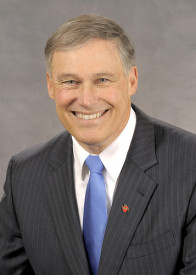
Washington’s new governor, Jay Inslee, has “pledged to reduce carbon emissions in the state’s transportation system.” He’s named a new transportation secretary, Oregonian Lynn Peterson, who appears to feel similarly. And in his most recent public statements about transportation, he’s talked about the need to preserve and maintain existing roads—a sensible priority that does little to boost greenhouse emissions.
That’s the good news. The bad news is that as a gubernatorial candidate, Inslee supported massive highway expansions, including widening the Columbia River Crossing, SR-520, SR-509, SR-167, and I-405, as well as completing the North Spokane Corridor. In even worse news, the Washington House Democrats’ initial transportation proposal emphasized highway mega-projects while giving short shrift to maintenance and preservation: a lopsided, “fix-it-last” set of transportation priorities.
All of which raises an important question: how can state officials reconcile support for new urban highways with a desire to reduce the climate impacts of transportation?
The short answer: they can’t. All else being equal, widening urban highways will boost long-term greenhouse gas emissions from cars and trucks. By Sightline’s estimates, each lane-mile of new urban highway could boost greenhouse gas emissions by up to 186,500 tons over 50 years, mostly from long-term traffic growth induced by wider roads. (And in case you care, those estimates do assume aggressive gains in vehicle efficiency.)
Luckily, there’s a way forward: a transportation package that may prove palatable to voters, but that wouldn’t substantially boost greenhouse gas emissions.
A statewide transportation poll released earlier this month showed a clear consensus on two points. Nearly nine out of ten respondents believed that repairing and maintaining existing roads was a “top” or “high” priority; and sixty-one percent supported the idea of taxing hazardous substances to pay for transportation, which was more support than for any other funding option mentioned.
Roll those results together, and you’ve got an intriguing possibility for a new deal on transportation: a tax on carbon—perhaps the planet’s most hazardous pollutant—dedicated primarily to maintaining and preserving existing transportation infrastructure, rather than road expansions.
That sort of package would be a win-win-win, because it would: (1) raise the revenue needed to address the state’s most pressing transportation needs, (2) avoid costly road expansions that boost both greenhouse gas emissions and sprawl, and (3) create incentives for the emissions reductions that the governor has pledged to achieve—and that the global climate so desperately needs.
But if the legislature doesn’t follow our advice, and keeps pushing forward with budget-busting, greenhouse gas-spewing mega-projects, Governor Inslee will face a difficult choice. We’ll be watching, with interest, how he handles it.


Comments are closed.